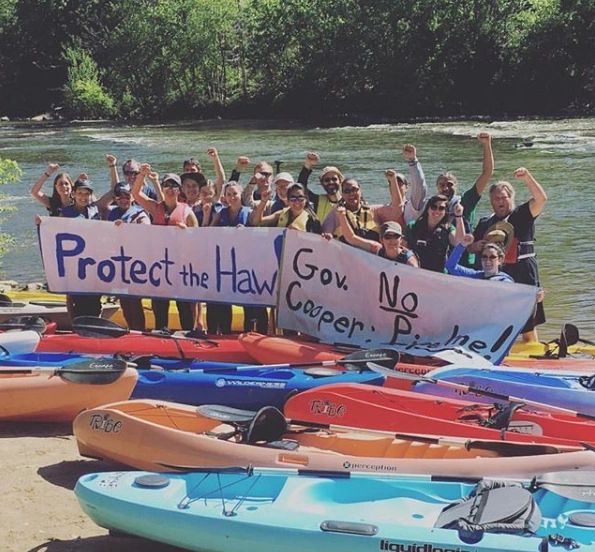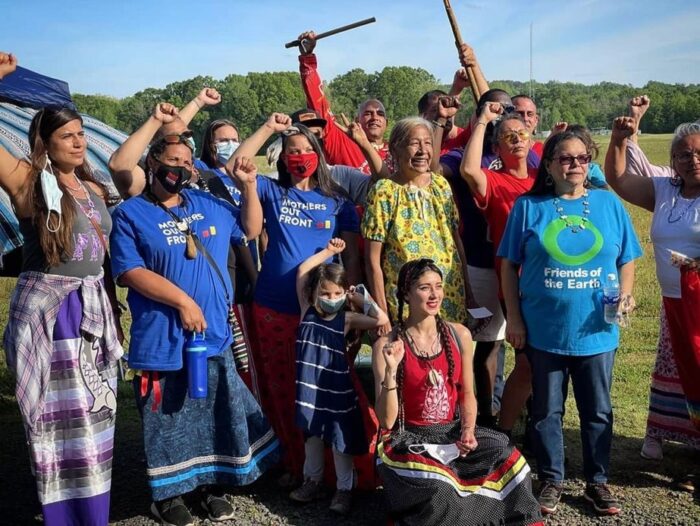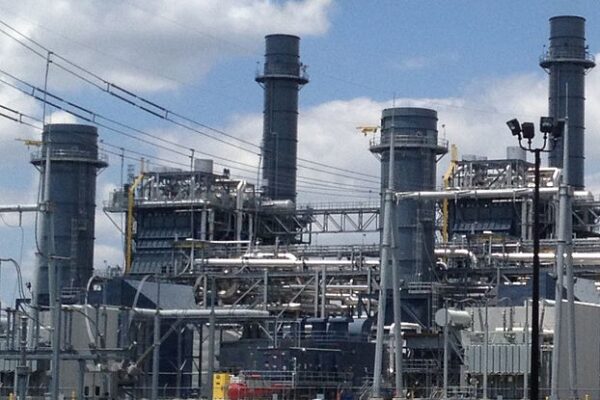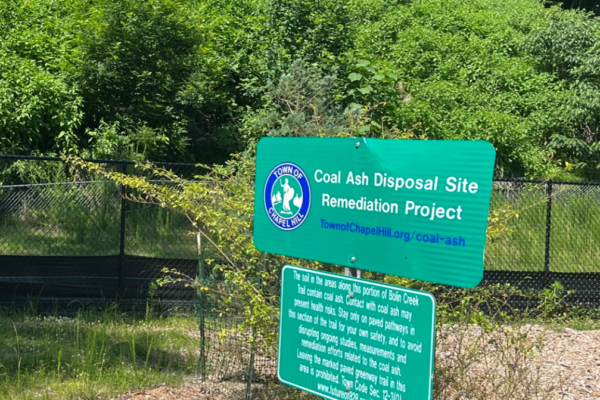This article has been contributed by CWFNC volunteer Hannah Budds
All images in this post are from the 7 Directions of Service Water Walk along the proposed MVP Southgate route. On May 2, small teams walked, paddled, or biked the entire proposed Mountain Valley Southgate route. 7 Directions of Service, which led the Water Walk, collaborated with the Pittsylvania County, Virginia NAACP Environmental Justice Committee to begin the day near the proposed site of the Lambert Compressor Station which plans to connect the MVP Southgate to the MVP main line – a bridge from nothing to nowhere. Learn more
Over the past few years, there has been a striking increase in the amount of state anti-protest laws passed in response to protests against the construction of oil and gas pipelines. Back in 2017 after the Dakota Access Pipeline resistance at Standing Rock Indian Reservation, state lawmakers in Oklahoma passed a bill which designated pipelines and many other facilities associated with oil and gas as “critical infrastructure”, and subsequently intensified the criminal and civil penalties for trespassing or damages. In that same year, the American Legislative Exchange Council (ALEC), an organization for state legislators which has shown support for the oil and gas industry, introduced the Critical Infrastructure Protection Act which became a model for other state anti-protest bills in years to come. Both the Oklahoma bill and the Critical Infrastructure Protection Act set a precedent for state lawmakers around the country seeking to curb protests against pipeline construction and opened the floodgates for other states to criminalize pipeline protests utilizing the same legislative framework.
As of May 2021, 15 states have now passed similar bills which upgrade charges associated with interfering with pipeline construction to misdemeanors and felonies, along with drastically increasing fines by thousands of dollars. Additionally, many of these laws penalize organizations associated with protests that trespass on or damage critical infrastructure and hold them accountable for the cost of damages.
In North Carolina, there is also reason for concern about the potential introduction of anti-protest legislation. Before it was cancelled by Duke Energy and Dominion Energy in 2020, the Atlantic Coast Pipeline (ACP) was set to disrupt communities in from Northampton County all the way down to Robeson County, spawning years of resistance from frontline communities, including the Lumbee tribe and rural, black community members along the now defunct route. At present, the company behind the Mountain Valley Pipeline (MVP) is hoping to build their 75-mile Southgate extension through Rockingham and Alamance counties. MVP and MVP Southgate would have a profoundly negative impact on the ecosystems and communities they cut through, and protestors have been organizing against the construction of these pipelines for exactly this reason.
If built, MVP Southgate would cross many rivers, streams, wetlands, and other water sources in North Carolina such as Jordan Lake, a drinking water source for about 500,000 people. The MVP Southgate route would run beside land which the Occaneechi Band of the Saponi Nation lives on and cross sacred Indigenous burial sites. As a result, the current construction plan for MVP Southgate would violate Indigenous rights and sovereignty by destroying sacred sites and disregarding the cultural practices and relationship to the land and water of the Occaneechi.

Pipeline resistance has led to the passage of anti-protest laws in numerous states across the US, including Oklahoma, Louisiana, Texas, and North Dakota. In this sense, past resistance to ACP and current protests against MVP potentially foreshadow a backlash from state legislators hoping to quash dissent from environmental protestors by introducing anti-protest “critical infrastructure” bills. In fact, HB805 and SB300 were recently introduced in North Carolina and sought to increase the legal penalties associated with participation in a “riot”. HB805, which passed both the House and Senate but was later vetoed by Governor Cooper on September 10th, tried to increase the penalty for engaging in “riot” which caused more than $1,500 of property damage or serious bodily injury to a felony. In its original form before being amended and ultimately vetoed, this meant that someone who participates in a protest can be convicted of a felony without causing any property damage or injury.
Another bill, SB300, similarly attempted to upgrade engagement in a “riot” to a felony and increase the amount of jail time at stake if the “riot” caused over $1,500 of property damage or serious bodily injury. This bill was ultimately enacted, but not before the increased charges and jail time for engaging in a “riot” which causes a certain level of damage were eliminated. While there is no mention of protecting oil and gas infrastructure in these bills, the passage of bills like these would serve as significant barriers to all forms of protest in the state. Further, they signal the willingness of state legislators to broadly criminalize protest, a potentially troubling sign for future protests against oil and gas infrastructure in North Carolina, including MVP Southgate.
A recent report from the Indigenous Environmental Network and Oil Change International discovered that Indigenous-led protests and resistance from the past decade have prevented the pollution of greenhouse gases equivalent to at least one quarter of annual emissions from both the U.S. and Canada. However, physical violence and unjust arrests of Indigenous human rights defenders and other protestors by local, state, and national authorities are already common reactions to pipeline protests, as seen in the Dakota Access resistance back in 2016. In conjunction with the increased passage of anti-protest laws across the U.S., this signals a dire need to advocate for the protection of the right to peacefully protest pipeline projects in North Carolina and beyond.
Sources:
Grist
NRDC
Huffington Post
Earth First Journal
International Center for Not Profit Law
Indigenous Environmental Network
NC WARN
WFAE





